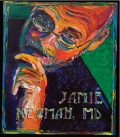Initial assessment
When you've spent as much time in a hospital as I have over the years, you tend to develop a sixth sense as to when something isn't quite right.
When you've spent as much time in a hospital as I have over the years, you tend to develop a sixth sense as to when something isn't quite right—when there's a fly in the ointment, a monkey wrench in the gears. There is a certain rhythm and pace to the admission and discharge of patients that we all have been through. Sometimes things get delayed, when the hospital is full to bursting or there are really sick patients on the ward. But still there is a pattern, a flow, an illogical logic. Patients back up in the ED waiting for beds, transportation is slowed, and rooms aren't cleaned in a timely fashion. Histories are taken and physical exams performed, labs are drawn, tests are ordered. It's to be expected.
But sometimes, something sets your internal alarm buzzing. And this was one of those times.

I'd been waiting forever for him to be ready for me. While I waited, I gazed around me at the old county hospital. The tacky olive-green paint was faded and the carpets needed a haircut. Things were running really slowly despite the fact that the hospital did not seem to be that busy. Sometimes you just have to be patient, though you're ready to get going (and would rather be home). I started to look at my phone but realized my battery was almost dead and I had not brought a charger.
Then nurses swarmed into the room entering information. It was hard to talk with all their intake questions. I tried to get his attention but there was too much action. I waited; I didn't have much choice. We looked at each other, physician and patient, waiting for a chance to begin. I felt like I should have priority in the process, but that's not how the medical machine operates sometimes.
We introduced ourselves. He looked to be in his mid-thirties, skinny with a slight paunch like an athlete who has given up hoops for hops. His clothes were rumpled and would have benefited from a good cleaning. His cheeks were sunburned but not around his eyes. Was it a medical condition or just too much solar exposure with sunglasses? I don't think his skin had seen an SPF above 4. His hair was greasy, and he could have used a manicure. He seemed to be slightly confused or perhaps just really tired. It had been a long night for all of us. I thought that this could take a while.
It's hard to capture the odd nature of our conversation. It was not the usual history of present illness. Questions were asked and answered in a tangential fashion, if answered at all. Why are you here? What's bothering you? Are you in pain? We started to review the medication list, and I wasn't sure he knew as much about the meds as he needed to. It seemed like a risky situation.
The physical exam did not go smoothly. Usually this part of the evaluation proceeds in a predictable fashion—the examiner and examinee breathing, listening, prodding, and percussing in coordination. This can be like a dance, a pas de deux. But this was not a ballet. It was more like a square dance meets hip-hop. For example, speaking during auscultation makes it difficult to reveal subtle abnormalities.
But sometimes you can tell a lot by just looking at someone. Sherlock Holmes was the master of intense observation. I tried to be a detective myself, as I studied him closely. The sunburn, the wrinkled clothes, the disorganization began to tell a story. He looked slightly diaphoretic, and I noted a slight tremor. His pants seemed a size too large. Was this a style choice or weight loss? His breath was not good. I tried to see if his palms were red.
The sports network was on the room's TV and there were weekly game highlights playing. We both turned to watch an amazing replay. It was a moment to bond and get some answers. I asked if he watched a lot of football. Of course he did. I told him I loved to sit and drink beer during a game. He nodded, and with the ice broken, he launched into a long, disjointed story about a drunken tailgating party. The details were fairly inappropriate. I wanted to just ask if he drank every day, but I went for a more indirect approach. I asked what his favorite beer was, and he told me about his home brewing.
The diagnosis seemed to be coming into focus. The tremor, weight loss with a “beer belly,” poor hygiene, and disheveled appearance. I surmised he was an alcoholic, and I told him so, in no uncertain terms. I warned him about withdrawal, liver failure, low platelets—all the things I was so personally familiar with. His response was an impressive level of denial. His face turned even more red. He stood up and left the room with a blaze of expletives.
I guessed he would be back soon enough. I asked the nurse if we should call security. She chuckled and shrugged and asked me if I was anxious, having hallucinations, nausea, or a headache, and she noted my own worsening tremor. I thought my CIWA was about 9 or 10 and I asked her for some lorazepam. She said she'd try to get admit orders after she tracked down the admitting doctor, who'd just left the room in an angry rush.



